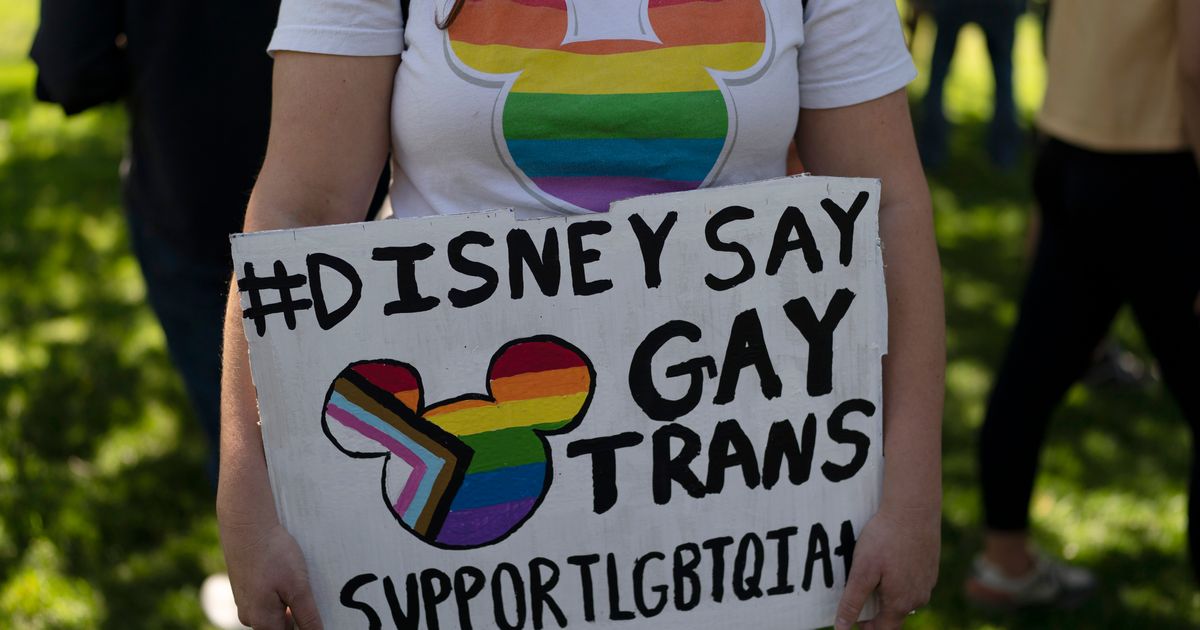
Anti-trans advocates failed to pass a measure at Disney’s annual shareholder meeting Wednesday amid the company’s largest, most expensive and contentious proxy contest in recent history.
Today, Chloe Cole, a 19-year-old who has spent much of the last two years testifying in support of legislation to ban gender-affirming care for minors, urged Walt Disney Co. shareholders to vote for a proposal to force the company to pay for services for people who choose to detransition.
Cole spoke as an advocate for Do No Harm, a group of conservative medical professionals who are skeptical of gender-affirming care, and presented the proposal on behalf of the National Legal and Policy Center, a conservative group that challenges what they see as abuse and corruption in government and business.
“Disney pays for gender transition interventions, but not detransitioning care,” Cole said at the meeting. “Therefore, the company discriminates based on gender identity, under [federal] regulations.”
The proposal was just one of a series of proposals from both right- and left-wing groups. One shareholder proposal targeted the company’s contributions to politicians who support anti-abortion laws and former President Donald Trump’s stolen election claims. Another from the National Center for Public Policy Research, a Disney shareholder, urged the company to disclose its charitable contributions of $5,000 or more and criticized Disney for pursuing “radical gender ideology” by contributing to organizations that support the LGBTQ+ community, such as GLSEN and the Trevor Project.
The board quickly voted against all of these proposals. In company documents, the board recommended rejecting the National Legal and Policy Center’s proposal because it “intended to serve the particular interest of the proponent.”
These proposals were presented amid the larger fight at Disney over the future makeup of the board. At the beginning of the meeting, Disney CEO Bob Iger quickly defeated an activist investor, Nelson Peltz of the hedge fund Trian Partners, which spent $25 million to get shareholders to vote for its two board candidates. The move ended a months-long scuffle over the company’s future.
Cole has made a name for herself as a political detransitioner and has traveled to Florida, Idaho, Kansas, Tennessee and elsewhere, financed by Do No Harm, to share her story of transitioning and later feeling that she had been harmed by the medical system.
Detransition and patient regret is exceedingly rare. A review of 27 studies involving 8,000 teens and adults who had received gender-affirming surgeries showed that only 1% expressed regret, and for some, this feeling was only temporary.
A recent study showed that 99% of patients who received a double mastectomy — often known as top surgery — expressed satisfaction with their results.
Despite what contemporary medical evidence shows, rhetoric around detransitioning and regret among transgender youth has been a rallying cry for conservatives eager to push anti-trans legislation in state legislatures across the country.
“Disney has become the Ursula that is stealing the voices of thousands of little Ariels across the world, telling us we can be something that we can never become,” Cole said. “The lawsuits are coming, sir.”
Lawmakers in Florida, which is home to the Walt Disney World Resort, recently failed to pass a bill that would force state insurance plans to cover “detransition treatments.” Other states have tried to pass laws that create a private cause of action for patients and families to sue medical facilities.
But in reality, Cole is one of few patients to sue a medical provider over gender-affirming care.
As more than 20 states have barred access to gender-affirming care for youth and some provisions for adults, many transgender people have had to travel greater distances and pay out-of-pocket to receive care — or put their medical transitions on hold.




